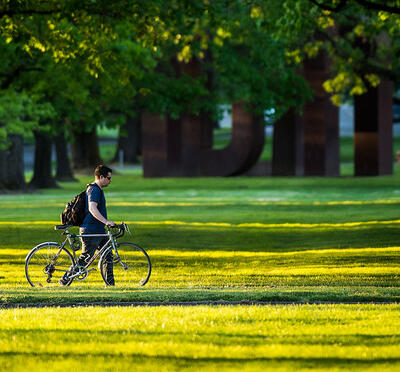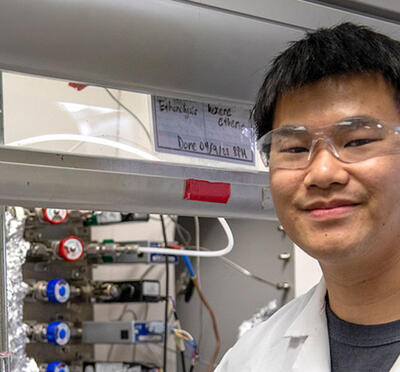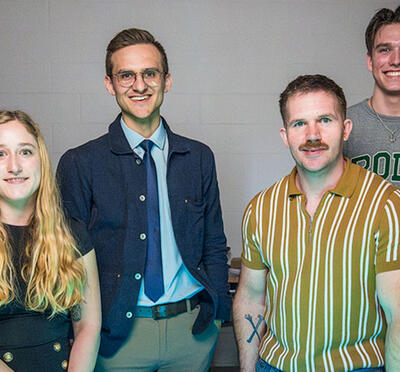One of seven siblings, Blessed Ndlovu grew up without electricity or running water in rural Zimbabwe, a landlocked nation in southern Africa with over 15 million people in an area roughly 1.5 times the size of Oregon. In Ndlovu’s small village, opportunities were limited. Subsistence farming was the norm.
When Ndlovu was 10, his father died of tuberculosis, so his grandfather assumed the role of father. It was Ndlovu’s grandfather who urged him to follow his heart and not pursue the traditional career track in Zimbabwe, which for a Black person meant working for white people or the government.
“My grandfather had different expectations for me,” Ndlovu said. “He pushed me to break barriers and never wanted me to stay in a position that perpetuates the traditional mindset in Zimbabwe.”

Now 37, Ndlovu has a chemical engineering degree from Oregon State University, an 18-month-old son, and a future that is somewhat in flux — in part because he wants the best life possible for his boy.
Ndlovu attended primary school in his childhood village and high school in the nearby city of Victoria Falls, home to 60,000 people and the world’s largest waterfall. Although Ndlovu had an early interest in medicine, he couldn’t afford medical school. So, he chose to go to college for accounting, because math came easy to him.
After almost two years working as a “minion” in the accounting offices of a grocery chain, Ndlovu knew he did not want to spend his life crunching numbers at a desk. Complicating matters, Zimbabwe in 2007-08 was entangled in a severe economic downturn and major political crisis. (The worldwide economic recession would descend a year later.) Around this time, Ndlovu’s mother died of malaria.
“I was in this place where I really didn’t know what I wanted to do,” he said. “When my mom died, it was like all the light was lost.”
Ndlovu found support back in his village. His uncle was a rafting guide on the nearby Zambezi River, so Ndlovu joined him. He sometimes earned less than $25 per month, but he enjoyed rafting, being outdoors, and meeting interesting people. Because most of his clients were from the U.S. or Australia, he started studying English, which he now speaks fluently, along with several African languages.
Guiding river trips is how he met his wife, Cassandra, who is American. The couple moved to Oregon. He worked as a rafting guide on the Rogue River and took classes at Rogue Community College for two years before enrolling at Oregon State to study chemical engineering.
Finding his way as a 33-year-old undergraduate student was challenging at times, Ndlovu said, because the other students were all so much younger. And being from an African country added to the challenge of building social connections. But Ndlovu had good support from engineering faculty like Skip Rochefort and Phil Harding.
“Dr. Harding really understood that ‘different’ students like me face unique challenges, and he would always make time for me, even just to ask how my family was doing back home,” Ndlovu said. “He made me feel like my success as a student was important to him, and was a great resource to me and a lot of other students.”
One time, driving home in the wee hours following a long night of studying, he was pulled over by a police officer, who asked to see his license and registration. Ndlovu handed the officer his license, but when he reached toward the glove compartment to get the vehicle registration, the officer pulled his gun.
“I had never experienced anything like that,” he said. “To have a gun pulled on me.”
When George Floyd was killed, it was traumatizing for Ndlovu.
“I realized that could have been me,” he said.
After graduating in 2020, Ndlovu worked for a year at PeytriaRx Engineering in Eugene before recently relocating to the Midwest to be closer to his son’s grandparents.
“I’m looking at where I want my son to grow up,” he said. “The way things are changing, especially in this country, you think about that. There are not a lot of Black people in Oregon. There are more in Wisconsin, so I’m a bit more at ease here, but it’s still a challenge.”
He also wrestles sometimes with the cultural emphasis in the U.S. on hard work to get ahead.
“It seems that here you are told to work harder and harder to get more and more, but I’m not sure people really get what they are looking for,” he said. “Back in Zimbabwe, people don’t have nearly as much, but they laugh more and don’t seem as depressed.”
He admits, however, that he wouldn’t have had the same opportunities in Zimbabwe.
“I would have never had the chance to become an engineer,” he said. “And because I am here, I am grateful that I can help support my family back home. So, you have to pick one path and stick with it.”
What does he miss most about Zimbabwe?
“The laughter,” he said. “In my village, you would hear laughter constantly, from morning to sundown. That is the one thing you always hear.”
His current dream job?
“Doing engineering while being outdoors a lot,” he said. “And a job that would allow me to spend lots of time with my son.”
Would his grandfather be proud of his life path?
“Yes, I think so.”



